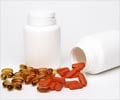A new study suggests that proper intake of vitamin D (the 'sunshine' vitamin) is related to better physical function in seniors.
Proper intake of vitamin D (the 'sunshine' vitamin) is related to better physical function in seniors, a new study has said.
Dr. Denise Houston from the Sticht Center on Aging at Wake Forest University and her colleagues studied the relationship between vitamin D status and physical function in a group of relatively healthy seniors living in Memphis, TN and Pittsburgh, PA.This study was part of the Health, Aging, and Body Composition (Health ABC) study initially designed to assess the associations among body composition, long-term health conditions, and mobility in older adults.
For Houston's segment of the investigation, she studied 2788 seniors for 4 years. At the beginning of the study, they assessed vitamin D status by analyzing each person's blood for 25-hydroxyvitamin D, a precursor for activated vitamin D.
At baseline and then 2 and 4 years later, the research team then determined whether circulating 25-hydroxyvitamin D was related to the participants' physical function.
Specifically, they looked at how quickly each participant could walk a short distance (6 meters) and rise from a chair five times as well as maintain his or her balance in progressively more challenging positions.
ach participant was also put through a battery of tests assessing endurance and strength.
Advertisement
And, although physical function declined over the course of the study, it remained significantly higher among those with the highest vitamin D levels at the beginning of the study compared to those with the lowest vitamin D levels.
Advertisement
In fact, more than 90 percent of them consumed less vitamin D than currently recommended, and many were relying on dietary supplements.
The results of the study were presented on April 25 as part of the scientific program of the American Society for Nutrition, composed of the world's leading nutrition researchers, at the Experimental Biology 2010 meeting in Anaheim.
Source-ANI
RAS















